#Development Structure
Explore tagged Tumblr posts
Text
<div style="white-space:pre-wrap">
🧠 FREE WRITING LESSON — THE MOST POWERFUL CHARACTER DEPTH TRICK YOU’LL EVER READ.
Let’s say your character sucks.
She’s flat. Predictable. “Strong” in all the wrong ways. Let’s call her Nicolle. Or Carol. Or whatever name Hollywood gave her.
She’s a superhero. She’s got powers. She’s got sarcasm. She takes no shit. She leads the squad. She’s admired by everyone — and loved by no one.
You’ve seen this character before. Now watch what happens when you give her one secret she doesn’t brag about.
Nicolle has two sons.
She’s raising them alone — to become men like her late father: A man who sacrificed everything to raise her after her mother disappeared, broke, or gave up.
The world sees Nicolle as the apex of visual empowerment. But the world doesn’t see:
The arguments with her boys’ father — about what being a real dad means.
The prayers whispered in the dark over a fevered forehead.
The way she ghosted the only man she maybe wanted, not because she’s flaky — but because she doesn’t know if wanting love makes her a bad mother.
The nights she tucks her boys in, then collapses into her bed, staring at the ceiling, heart full of ache, because she gave the world her strength but kept no one to hold hers.
They don’t see the days her sons cry after watching her get slammed through buildings on TV.
Held by the throat. Left for dead. Motionless for seconds too long. Until she rises — because she has to.
They don’t see the breakdowns. They don’t see her flinch.
They assume she doesn’t feel fear. But the truth?
She feels it every single time.
She’s not fearless. She’s never been. But fear is a luxury she doesn’t have.
That’s a luxury for men. She is a god. And she will make any threat scream that truth — as she crushes it beneath her bleeding hands.
Because when demons invade, tyrants rise, and monsters descend, She suits up.
Not for hashtags. Not for feminism. Not for attention.
She suits up because the idea of her sons growing up in a world she could’ve fought for and didn’t — is more terrifying than death itself.
And she will not let the universe teach her boys that their mother ever cowered.
🔺 THE TRIFECTA THAT MAKES ANY SUPERHERO NEXT-LEVEL:
Intimacy. Contradiction. Duty.
Intimacy gives them a soul — something they protect more than their own body.
Contradiction gives them depth — because perfection is forgettable, but conflict creates memory.
Duty gives them immortality — because we remember those who bled for more than applause.
Give a character that trifecta — and suddenly:
She’s not annoying. She’s haunting. She’s not fanfiction. She’s canon. She’s not shallow. She’s legend.
✍️ That’s how you fix a weak character. You don’t soften her. You give her something to fight that fists can’t touch.
And suddenly?
She’s not a girlboss. She’s the last myth your enemies ever tell themselves before they die.
</div>
#writing tips#character development#blacksite literature™#scrolltrap#fiction writing#writers on tumblr#writing community#emotional writing#plot building#motherhood as power#writing advice#writing exercise#heroic narrative#feminine rage#masculine duty#superhero writing#literary structure#cadence weaponry
2K notes
·
View notes
Text
🔪 3 Plot Twists That Slap (and 1 that should be arrested) 🔪

hello and welcome back to me yelling on main about storytelling crimes. today we are talking about plot twists. specifically: the good, the god-tier, and the why-would-you-do-this-i-trusted-you tier.
let’s go.
✨ The Twist That Reframes Everything ✨ a.k.a. the “wait. WAIT.” twist. This is when you drop a twist that doesn’t just add drama - it recontextualizes the entire story. It makes the reader go back and reread earlier scenes like “was this character ALWAYS sketchy or am I just stupid??” It retroactively changes the emotional weight of everything that’s happened. Suddenly that offhanded comment in chapter three hits like a brick. The romance subplot becomes 500% more tragic. The villain’s motive makes SENSE now. Delicious.
✅ Best used when: the breadcrumbs are subtle but real. The twist shouldn’t come out of nowhere - it should feel inevitable in hindsight. Like Sixth Sense, Knives Out, that one betrayal in your favorite anime you still haven’t recovered from.
2.🧨 The Emotional Betrayal It’s giving: “i would’ve died for you” energy. This is the kind of twist that hurts. You thought they were loyal. You thought they cared. They did care - and still did it anyway. Or they never cared, and now you’re spiraling. This twist slaps because it’s not just about plot, it’s about trust. It stabs the characters AND the reader in the same motion. Bonus points if it’s a slow burn betrayal. Bonus bonus points if the betrayer feels genuinely torn up about it.
✅ Best used when: the reader is emotionally attached. Don’t waste this one on a side character we barely know. Save it for the love interest. The best friend. The mentor figure with dad energy. Make it personal. Make it RUIN lives.
3. 🧊 The “They Were Dead the Whole Time” but Make It Interesting Listen. This one’s risky. It’s a classic for a reason but also easy to flop. But when done well? Haunting. Creepy. Unhinged in a gorgeous way. It doesn’t have to be death either - maybe the character’s been possessed. Or they’re not real. Or the narrator’s memory is lying. The KEY is to not lean too hard on the shock. Lean on the vibes. Give it eeriness. Make it a slow unraveling. Give us dread. Give us melancholy. Give us psychological decay with a side of unreliable narrator.
✅ Best used when: you’re writing something surreal, gothic, speculative, or emotionally weird. This twist isn’t about plot logic, it’s about atmosphere and emotional rot.
🚨 The Twist That Should Be Arrested: “It Was All a Dream” 🚨 I’m sorry but. no. if I read 80k words of someone’s descent into madness just to find out it was their stress dream and now they’re normal again?? I will throw the entire book into a lake. This twist erases tension instead of escalating it. It invalidates everything the reader emotionally invested in. It’s the narrative equivalent of gaslighting. don’t do it. UNLESS - and this is a big unless - you’re doing it with INTENT. Meta intent. Dream-within-a-dream psychological horror intent. If you’re gonna do it, it better haunt me. It better RUIN me. Otherwise? Into the lake.
okay that’s all. go forth and commit plot crimes responsibly. bonus points if you use all three Good Twists in the same story and then look me in the eye like “oh was that too much?”
it wasn’t.
tag me when you emotionally destroy someone with it.
🕯️ download the pack & write something cursed:

#writing#writing community#writeblr#writers on tumblr#writeblr post#writing advice#plot twists#story structure#plotting tips#plot twist ideas#writing inspiration#storytelling#character development#narrative structure#thewriteadviceforwriters#on writing#how to write#writers and poets#writers block#creative writing#writing tips#writing project#fiction writing#novel writing#romance writing#writing a book#writing blog#writing characters#writing guide#writing help
553 notes
·
View notes
Text
rookanis really is like... first base is you walking through the haunted ruins of my mind to find me in an act of breathtaking psychological intimacy with added tam lin undertones. second base is baked goods (cautious erotic connotations). third base is deicide. THEN we kiss. also second deicide of course once you pop it's hard to stop
#I cannot stress this enough -- ideal relationship development for me. best friends who kiss and also kill god together sometimes#no notes#dragon age#dragon age: the veilguard#dragon age: the veilguard spoilers#dragon age spoilers#rook x lucanis#rookanis#lucanis dellamorte#oc: Ellaryen Ingellvar#the way inner demons is structured reminds me a lot of the development through garak's stories in the wire in ds9#which was something that some long time readers might remember also made me feel INSANE to contemplate#in the very best of ways. I pray for my brain to get it together to the point where I can make the inner demons analysis post#that lives in my heart. I already have the video part of it put together. one day. one day please.#(the paralleling 'yours is the kindest voice in my mind' subtext especially is like. augh. AUGH.)#if I trust my thoughts to anyone it's you. you know my mind. I've assumed you know my heart because it beats for you it's been beating --#that thing mary kirby said about how both lucanis and spite trust rook above other people and themselves#heLLO hello can anyone hear me it all makes me feels so out of my mind
456 notes
·
View notes
Note
hiiii can i request wheelchair user riz :)))) np ofc
-@transgenderfabianseacaster
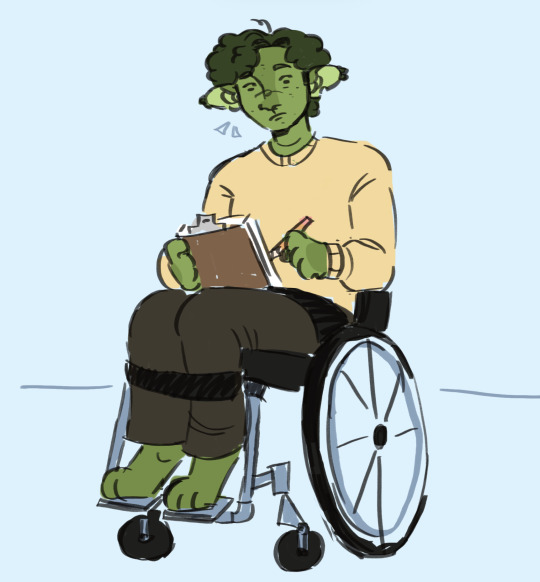
YES PLEASE !!!!
#opened up the flood gates for the wheelchair user Riz headcanons I’ve been stirring up since I started FH#so in fy riz is already using mobility aids for his chronic fatigue but doesn’t prefer the wheelchair because the one he has is a-#secondhand hospital chair and the handles make it easy for people to direct him around which he HATES#so for most of fy he uses a cane (his dad’s old one that he thinks adds on to his cool detective aesthetic)#but in sy he essentially develops an autoimmune disease caused by kalina#(because he was born with her his body doesn’t know how to function once he’s cured and attacks itself in response. I’ve thought an it a lot#but it’s too much to put in tags)#it causes him a lot of pain and fatigue so he uses his Kalvaxus money to buy himself a better chair! yay!#he used to fall out a ton for various reasons so his mom made him get straps#I also spent like 20 minutes trying to figure out if being digitigrade would effect the structure of the chair? I came to zero conclusions#anyways#riz gukgak#fantasy high#d20#dimension 20#fhsy spoilers#undescribed#request#my art
158 notes
·
View notes
Text
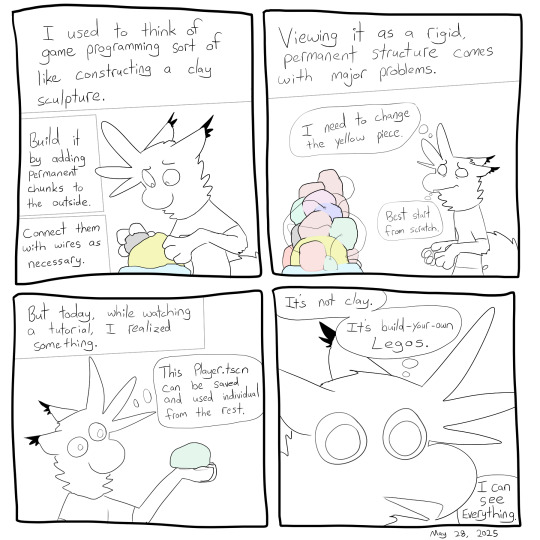
Dogstomp #3315 - May 28th Patreon / Discord Server / Itaku / Bluesky
#This basic stupid misunderstanding of the structure of things has been all that's holding me back#comic diary#comic journal#autobio comics#comics#webcomics#furry#furry art#game development#gamedev#godot#may 28 2025#comic 3315
108 notes
·
View notes
Text
one of the most important things terry pratchett has taught me is that it's okay to be angry. no one has ever said that to me before. he taught me that anger was an engine. that you can use that anger. that it goes hand in hand with love. he taught me to never underestimate my anger, because it's one of my strongest points. he taught me genuine anger was one of the world’s great creative forces. he taught me i shouldn't be fighting my anger, but what caused it. he himself said rage underlines everything he wrote. i never heard anger talked about so openly like that before and it's freeing, i suppose, to realize you are truly, truly not alone in your rage at the world. you never were.
#“Granny Weatherwax was often angry. She considered it one of her strong points. Genuine anger was one of the world’s great creative forces.#But you had to learn how to control it. That didn’t mean you let it trickle away. It meant you dammed it carefully#let it develop a working head let it drown whole valleys of the mind and then - just when the whole structure was about to collapse -#opened a tiny pipeline at the base and let the iron-hard stream of wrath power the turbines of revenge.“#not a moment goes by that im not thinking of that quote#ill stop going on about anger and pterry i promise it's just that im angry all the time and he's the only thing that has helped so far and#you dont get over that sort of thing#gnu terry pratchett#discworld#terry pratchett
2K notes
·
View notes
Text
I’m 100% supportive of people becoming obsessed with a background character in something but when people start saying something is bad because those background characters don’t get any character development we gotta slow down a little
#not all people in stories are actually characters#they are not individuals but rather something that add the the landscape and helps set the stage#like sorry you’re obsessed with a guy who’s only purpose is to further the plot but pls remember all plots are contrived#someone made it up whatever that character did isn’t real and someone decided they do that it doesn’t just happen#one of my favorite types of characters is characters who are actually setting#my all time favorite example of this is in Toni Morrison’s A Mercy#the husband is introduced and given a full backstory and then in the first couple chapters he dies#because he as an individual didn’t matter the point of him being there was not to be developed#the point of him being there was because his initial existence is the only reason the actual characters interact#if this doesn’t make sense do not tell me I’m high and scared so im thinking about narrative structure and plot devices to calm down
168 notes
·
View notes
Text
I think in media analysis and just like, engaging with art of any form, you can focus on being right all the time or you can focus on enjoying yourself, and people who do the latter often end up being pretty good at predicting things (and are often delighted by being wrong in an interesting way) and people who do the former usually end up being not just miserable, but also not very good at being right in the first place.
#i'm thinking about that how to enjoy things more essay it is actively rewiring my brain as we speak#but specifically the part about how the author tries to guess twists or develop a sense of pop music structure#but also how it's win-win: you guess right OR you are delighted by a well-executed subversion#and like. some works are just bad OR not to your taste or both but like. you'll still have more fun by not minding if you're wrong
132 notes
·
View notes
Text
Let's talk about story structure.
Fabricating the narrative structure of your story can be difficult, and it can be helpful to use already known and well-established story structures as a sort of blueprint to guide you along the way. Before we delve into a few of the more popular ones, however, what exactly does this term entail?
Story structure refers to the framework or organization of a narrative. It is typically divided into key elements such as exposition, rising action, climax, falling action, and resolution, and serves as the skeleton upon which the plot, characters, and themes are built. It provides a roadmap of sorts for the progression of events and emotional arcs within a story.
Freytag's Pyramid:
Also known as a five-act structure, this is pretty much your standard story structure that you likely learned in English class at some point. It looks something like this:
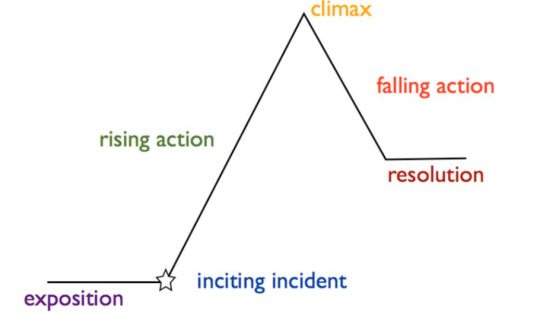
Exposition: Introduces the characters, setting, and basic situation of the story.
Inciting incident: The event that sets the main conflict of the story in motion, often disrupting the status quo for the protagonist.
Rising action: Series of events that build tension and escalate the conflict, leading toward the story's climax.
Climax: The highest point of tension or the turning point in the story, where the conflict reaches its peak and the outcome is decided.
Falling action: Events that occur as a result of the climax, leading towards the resolution and tying up loose ends.
Resolution (or denouement): The final outcome of the story, where the conflict is resolved, and any remaining questions or conflicts are addressed, providing closure for the audience.
Though the overuse of this story structure may be seen as a downside, it's used so much for a reason. Its intuitive structure provides a reliable framework for writers to build upon, ensuring clear progression and emotional resonance in their stories and drawing everything to a resolution that is satisfactory for the readers.
The Fichtean Curve:
The Fichtean Curve is characterised by a gradual rise in tension and conflict, leading to a climactic peak, followed by a swift resolution. It emphasises the building of suspense and intensity throughout the narrative, following a pattern of escalating crises leading to a climax representing the peak of the protagonist's struggle, then a swift resolution.
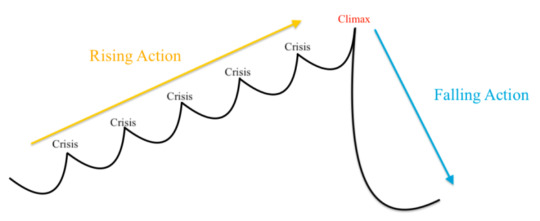
Initial crisis: The story begins with a significant event or problem that immediately grabs the audience's attention, setting the plot in motion.
Escalating crises: Additional challenges or complications arise, intensifying the protagonist's struggles and increasing the stakes.
Climax: The tension reaches its peak as the protagonist confronts the central obstacle or makes a crucial decision.
Falling action: Following the climax, conflicts are rapidly resolved, often with a sudden shift or revelation, bringing closure to the narrative. Note that all loose ends may not be tied by the end, and that's completely fine as long as it works in your story—leaving some room for speculation or suspense can be intriguing.
The Hero’s Journey:
The Hero's Journey follows a protagonist through a transformative adventure. It outlines their journey from ordinary life into the unknown, encountering challenges, allies, and adversaries along the way, ultimately leading to personal growth and a return to the familiar world with newfound wisdom or treasures.
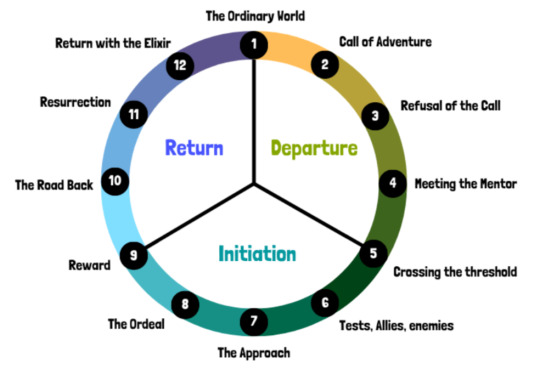
Call of adventure: The hero receives a summons or challenge that disrupts their ordinary life.
Refusal of the call: Initially, the hero may resist or hesitate in accepting the adventure.
Meeting the mentor: The hero encounters a wise mentor who provides guidance and assistance.
Crossing the threshold: The hero leaves their familiar world and enters the unknown, facing the challenges of the journey.
Tests, allies, enemies: Along the journey, the hero faces various obstacles and adversaries that test their skills and resolve.
The approach: The hero approaches the central conflict or their deepest fears.
The ordeal: The hero faces their greatest challenge, often confronting the main antagonist or undergoing a significant transformation.
Reward: After overcoming the ordeal, the hero receives a reward, such as treasure, knowledge, or inner growth.
The road back: The hero begins the journey back to their ordinary world, encountering final obstacles or confrontations.
Resurrection: The hero faces one final test or ordeal that solidifies their transformation.
Return with the elixir: The hero returns to the ordinary world, bringing back the lessons learned or treasures gained to benefit themselves or others.
Exploring these different story structures reveals the intricate paths characters traverse in their journeys. Each framework provides a blueprint for crafting engaging narratives that captivate audiences. Understanding these underlying structures can help gain an array of tools to create unforgettable tales that resonate with audiences of all kind.
Happy writing! Hope this was helpful ❤
Previous | Next
#writeblr#writing#writing tips#writing advice#writing help#writing resources#creative writing#story writing#storytelling#story structure#plot development#outlining#plot structure
519 notes
·
View notes
Text
Micro-tip: How to make emotional scenes hit harder
Don’t put the emotional payoff in the confrontation itself.
Put it two scenes later. Quiet. Off-guard. Uncontrolled.
Let your character hold it together when it matters.
Then let it fall apart in the silence that follows.
Not when they’re being watched.
When the door sticks.
When someone looks away.
When they forget the wine.
When they ask if anyone’s hungry just to fill the space.
Readers don’t cry when the character explodes.
They cry when the damage surfaces — quiet, and far too late.
#ao3 writer#writers on writing#fic writing#writing tips#writeblr#ao3 author#ao3 fanfic#ao3fic#writers on tumblr#female writers#character driven stories#writing#writing advice#character writing#character development#emotional tension#emotional writing#writing process#fiction writing#writing blog#narrative structure#character arcs#writting#writer on tumblr#writer tumblr#writer blog#writerblr#sub text#Quillver#creative writing
107 notes
·
View notes
Text
sukugo is a crack ship TO YOU. to me it's a perfectly legitimate ship, held back within the canon universe principally due to adherence to classic genre structures and not by lack of character compatibility
#sukugo#not to be a crack ship definition purist. but it doesnt qualify as a crack ship if the characters are totally compatible#and if a major reason that the ship is not canon is just because the characters aren't main characters and thus not the focus of the story#what i mean is that jjk has a pretty normal structure for a coming of age martial arts story#it has the young protagonist who is the focus of the story#who has a wise teacher who is killed by the villain to provide the protagonist with more motivation to defeat the villain#gojo and sukuna were both doomed by the narrative in that the narrative followed this classic structure. so long as yuji is the protagonist#and main character then gojo needs to die to allow him growth and focus#and sukuna needs to be defeated by yuji#sukuna and gojo's relationship could only develop to a limited extent within their fight because its only setting the stage for the final#fight between yuji and sukuna#BUT THERE ARE ABSOLUTELY MANY EXCHANGES BETWEEN GOJO AND SUKUNA THAT DEMONSTRATE THAT THEY ARE COMPATIBLE AS A SHIP IF THEY HAD#TIME AND SPACE TO DEVELOP THE STORY IN THAT DIRECTION#“teacher and villain set up to be on opposing sides but finding understanding and an equal and love in each other” is totally legit dynamic#thats the premise of tian ya ke/word of honor#what im saying is that sukugo are very compatible as a ship#but to have a ship like sukugo be believable in canon. their relationship needs to be given time to develop#more time than jjk is able to give it within its structure without more genre subversion and without them being main characters#jjk
97 notes
·
View notes
Text
Hate it when j&h adaptations give Jekyll a female love interest, like bitch, he HAS a love interest who is introduced on the first page, and his name is MR UTTERSON THE LAWYER.
#well technically it's “gabriel john utterson' but those are the first 4 words of the book#my random stuff#dr jekyll and mr hyde#jekyll and hyde#and on a more serious note-#it tells me that the adaptation understood nothing about the novella#because the queer subtext* is almost domtext#*and yes i say subtext as opposed to coding because#Stevenson's purpose was to oppose the repressive victorian social structures#and the unspoken social codes and unnecessary laws surrounding what people could and couldn't do#and; yeah sure there were plenty of those for straight relationships#but doubly so for queer ones#queerness is SO important to this novella even though it's never overtly mentioned#edit: just saw a post that reminded me of this one and I'd like to add:#adaptations that give jekyll a female LI seem to make her ONLY a love interest without any development#and usually they only exist to get raped or killed by Hyde#it's. not great.
215 notes
·
View notes
Text
I love how a well-written romance is so often structured as a mystery. A person starts with a certain idea about another person, and over the course of the story, they uncover more evidence that gives them a fuller picture of who the other person truly is. They learn about layers to the personality and backstory that give the other person more depth. They learn how the other person's personality meshes with theirs. Even the third-act misunderstanding fits the mystery structure--it looks like they've uncovered the final secret to the other person's identity, which is that they're not the worthy person they seemed to be, but then discover that they misinterpreted that evidence, or the other person takes steps to apologize and repair the level of trust. When the mystery is resolved, they've reached a full understanding of each other and know they've found a partner they can trust their whole future to.
#also comedy works along a mystery structure#so a romantic comedy is like a double mystery#two different types of mystery clashing with each other and causing hilarity before the truth is finally revealed#if nothing else this batb diversion will spark some interesting romance thoughts#this came to me because i've been slowly rereading beth brower's 'the q'#and i just hit the scene where quincey gets to observe arch outside of work for the first time#just a lovely moment of revelation#and i think that's the one thing that story does really well#and the author in general is very good at applying this mystery dynamic to all her character dynamics whether romantic or platonic#i rarely find myself able to believe in the strength of her characters' bonds that are supposed to exist before the story started#but the developing relationships are so good because of this endless uncovering of mysteries deepening the bonds in a very compelling way#adventures in writing
304 notes
·
View notes
Text
Anyways when are we gonna stop pretending this isn't about "getting back at" an imagined trans guy. Good job! You both finally recognized trans men as men, AND ignored that they are punished for being men in one sentence. Really special work happening here.

The controversy is in only considering trans men as "men" in a way to hurt them. While also in a way misgendering:
"You're only a man because I know implying you act like a cis man in all the bad ways hurts you. In reality I see you all as hysterical bitches out to hurt the rest of the trans community" isn't progressive. It's just being nasty to be nasty.
Imagine hating trans people so much you joke about wishing they all died, then make posts like this, and assume that people will still think you actually care about the trans community.
#like. come on.#imagine thinking acting like a middleschool bully is fun and cool ??#like. you know what youre doing.#and dont start on the “well this is about trans women and the 'dude' problem!!”#bc if it was REALLY about that then trans men wouldnt get mentioned like that#as most trans men get that you just dont call a trans woman dude.#“how do i find the sneakiest eay to take shots at trans people i dont like” isnt very progressive and leftist of you#be better#also nice job using the 'dude' in both the gendered and gender removed contexts#you are ALMOST to the point of recognizing how that word works !!!#wheres the fucking post breaking down the five different ways that Dude developed#“dude” in the “reference to a masculine person”#“dude!” the exclamation similar to “fuck!”#“dude” with a comma as in leveling the playing field as spoken from a woman to a man#etc etc etc#its used in two different ways structurally in this post#which. would be interesting to discuss. if this entire thing wasnt steeped in transandrophobia#idk the more i see of these posts the more im convinced#that theres a small group of trans gals on here (SMALL) that are angry that trans men exist for a number of reasons#and they just wanna take their anger out on acceptable targets#mark my words these same accounts wouldve been making these same posts about ace/aro ppl when it was cool to dunk on them#like why do people have to take shots at people in community with them rn#we are being hunted for sport irl and then you get online and find ppl trying to crumble solidarity#with silly little stupid shit like this
65 notes
·
View notes
Text
everything about the world of girls' last tour is so fascinating to me. like seeing seemingly thousands of years of human civilization built up on top of each other is very interesting to see and explore. seeing the massive ancient columns supporting the upper tiers of the city being built up on by makeshift newer technology of a society who long since lost the capacity to maintain these facilities properly. seeing ancient factories still with modern japanese labeling still producing rations centuries later, now with the later developed "contemporary kana" labeling. like it all just adds to how alive this city used to be, and how tragic it is now that that tapestry of humanity was completely wiped away
#🫂#girls last tour#i don't know if this post is coherent but i'm just so obsessed with the distinction glt makes between the ancient structures of the city an#the newer structures#girls when there's modern development on top of the ancient superstructure at the occasion
906 notes
·
View notes